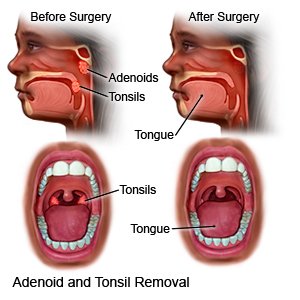After Adenoidectomy in Children
Medically reviewed by Drugs.com. Last updated on Apr 6, 2025.
AMBULATORY CARE:
An adenoidectomy
is surgery to remove your child's adenoids. Adenoids are located at the back of your child's nasal passage. They may need to be removed if they are enlarged or if they cause infections often.
 |
Call your local emergency number (911 in the US) if:
- Your child has trouble breathing.
Seek care immediately if:
- You see bright red blood in your child's saliva or coming from his or her nose.
Call your child's surgeon or doctor if:
- Your child has signs of dehydration, such as dark yellow urine, little or no urine, or crying without tears.
- Your child has a fever above 102°F (39°C) or a low-grade fever for longer than 2 days.
- Your child has severe pain, even after he or she takes medicine.
- You have questions or concerns about your child's condition or care.
Drugs used to treat this and similar conditions
Paracetamol
Paracetamol (Panadol, Calpol, Alvedon) is a widely used over-the-counter painkiller and fever ...
Amoxicillin/clavulanate
Amoxicillin and clavulanate potassium is a combination antibiotic used to treat bacterial ...
Ozempic
Learn about Ozempic (semaglutide) for type 2 diabetes treatment, weight management, cardiovascular ...
Acetaminophen
Acetaminophen is a widely used pain reliever and fever reducer for conditions like headaches ...
Gabapentin
Gabapentin is an anti-epileptic drug, also called an anticonvulsant. It is used to treat some types ...
Tramadol
Tramadol is an opioid medication that may be used to treat moderate to moderately severe chronic ...
Amoxicillin
Amoxicillin is a penicillin antibiotic that fights bacteria. It is used to treat many types of ...
Furosemide
Furosemide is a loop diuretic used to treat fluid retention and high blood pressure by increasing ...
Cefdinir
Cefdinir systemic is used for bacterial infection, bronchitis, middle ear infections, pneumonia ...
Medicines:
Your child may need any of the following:
- Prescription pain medicine may be given. Ask how to give this medicine to your child safely.
- Acetaminophen decreases pain and fever. It is available without a doctor's order. Ask how much to give your child and how often to give it. Follow directions. Read the labels of all other medicines your child uses to see if they also contain acetaminophen, or ask your child's doctor or pharmacist. Acetaminophen can cause liver damage if not taken correctly.
- Do not give aspirin to children younger than 18 years. Your child could develop Reye syndrome if he or she has the flu or a fever and takes aspirin. Reye syndrome can cause life-threatening brain and liver damage. Check your child's medicine labels for aspirin or salicylates.
- Give your child's medicine as directed. Contact your child's healthcare provider if you think the medicine is not working as expected. Tell the provider if your child is allergic to any medicine. Keep a current list of the medicines, vitamins, and herbs your child takes. Include the amounts, and when, how, and why they are taken. Bring the list or the medicines in their containers to follow-up visits. Carry your child's medicine list with you in case of an emergency.
What to expect after your child's surgery:
- Your child may have a low-grade fever for 1 to 2 days after his or her surgery.
- Your child may snore or breathe through his or her mouth due to swelling in his or her throat. His or her breathing will return to normal after the swelling goes down.
- Your child may have bad breath due to scabs that formed where his or her adenoids were removed. These thick, white scabs fall off in small pieces 5 to 10 days after surgery. Do not let your child blow his or her nose for 1 week after surgery, or as directed. Heavy bleeding may happen if scabs fall off when your child blows his or her nose.
How to care for your child after surgery:
Throat pain may make it difficult for your child to eat and drink. Liquids and proper nutrition are important for his or her recovery.
- Have your child drink plenty of liquids to avoid dehydration. Ask your child's healthcare provider how much liquid he or she should drink each day and which liquids are best.
- Have your child eat soft foods after his or her surgery. The sooner your child eats and chews, the quicker his or her recovery. Soft foods include applesauce, ice cream, scrambled eggs, or soups with soft vegetables, pasta, or rice.
- Increase your child's activities slowly. Ask your child's healthcare provider when he or she can return to school and his or her normal activities.
Follow up with your child's surgeon or doctor as directed:
Write down your questions so you remember to ask them during visits.
© Copyright Merative 2025 Information is for End User's use only and may not be sold, redistributed or otherwise used for commercial purposes.
The above information is an educational aid only. It is not intended as medical advice for individual conditions or treatments. Talk to your doctor, nurse or pharmacist before following any medical regimen to see if it is safe and effective for you.
Learn more about After Adenoidectomy
Care guides
Further information
Always consult your healthcare provider to ensure the information displayed on this page applies to your personal circumstances.
